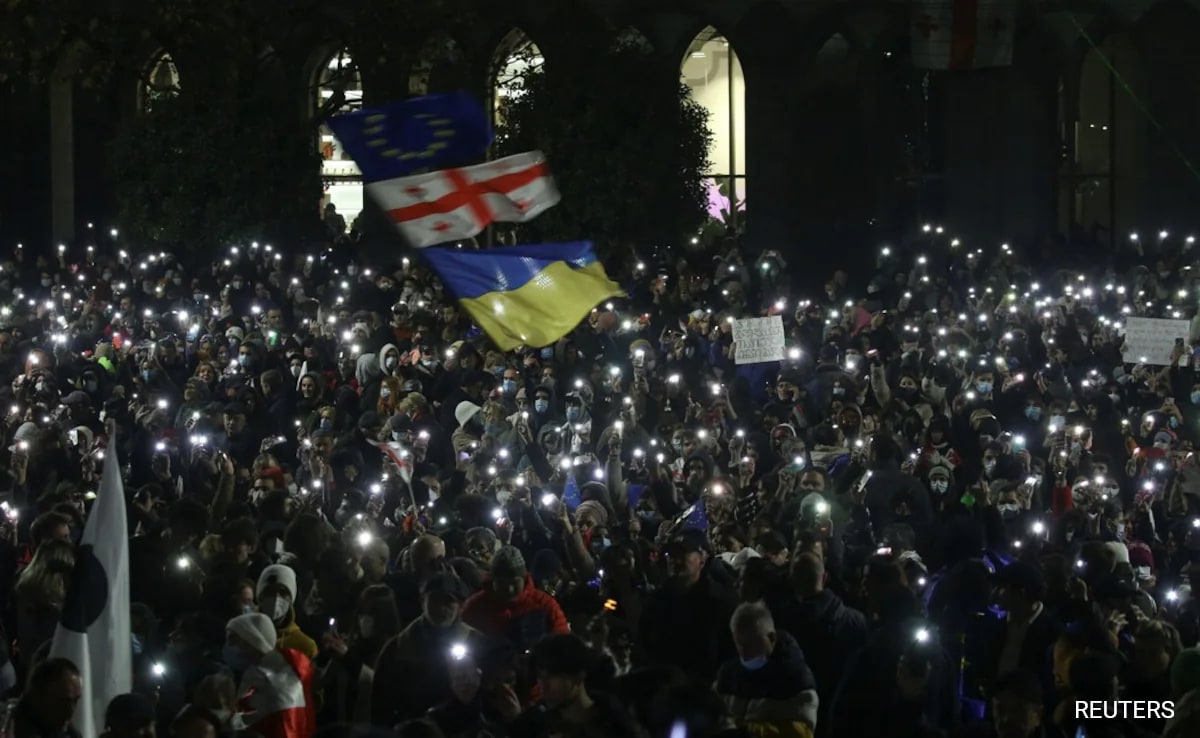
Thousands of protesters returned outside the parliament in Tbilisi on Saturday to protest against the Georgian government's decision to suspend European Union (EU) membership talks amid a post-election crisis. Police deployed water cannons, tear gas and pepper sprays to confront the pro-European protesters, who have been on the streets since Georgia's ruling party on Thursday said it was halting EU accession talks until 2028.
Protesters carrying Georgian and EU flags marched towards the Soviet-built parliament building. They hurled fireworks at police officers, while authorities forced them away from the assembly and down Rustaveli Boulevard toward the opera house, according to a report by Reuters. At least 10 employees of the Ministry of Internal Affairs and 32 police officers were reportedly injured during the confrontation with the protestors, the Black Sea nation's interior ministry said.
As per the Interior Ministry, 107 people were detained for "disobedience to lawful police orders and petty hooliganism."
Reuters
"Throughout the night... protesters threw various objects, including stones, pyrotechnics, glass bottles, and metal items, at law enforcement officers," it said.
Unrest In Girogia
Georgia has been rocked by turmoil since the ruling Georgian Dream party claimed victory in the October 26 parliamentary election that the pro-EU opposition said was fraudulent. The party has ruled Georgia since 2012 and is often accused by critics of trying to move the country closer to Russia and away from the EU. Ahead of October's elections, it pushed through legislation targeting independent civil society and curbing LGBTQ rights, drawing warnings from Brussels.
After the party claimed victory in last month's election, Opposition lawmakers have questioned the results of the election. Alleging fraud, they boycotted the new parliament.
Following this, the country's President Salome Zourabishvili, who is reportedly at loggerheads with the governing party - called the one-party parliament "unconstitutional". She sought to annul the election results through the country's constitutional court.
Reuters
The European Parliament on Thursday backed a resolution calling last month's election as the latest stage in Georgia's "worsening democratic crisis" and saying that the ruling party was "fully responsible", according to a report by BBC.
The resolution also expressed concern about reports of vote manipulation and buying, voter intimidation and harassment of observers.
Following the resolution, Prime Minister Irakli Kobakhidze said his government had "decided not to bring up the issue of joining the European Union on the agenda until the end of 2028".
He said Georgia would continue to implement the reforms required for accession and that it still planned to join by 2030, but added that it was "crucial for the EU to respect our national interests and traditional values".
Georgia has the official EU candidate status since 2023. However, according to the BBC report, Belgium had halted Georgia's accession process earlier this year over the country's "Russia-style law" targeting organizations accused of "pursuing the interests of a foreign power"
Latest Protest
European Union accession is a popular issue in Georgia, and freezing of application talks has been met with widespread anger from people, who aim to see EU membership written into their constitution. Thousands massed outside the parliament building in Tbilisi on Thursday before they were dispersed by riot police using water cannons and gas.
Reuters
The protesters returned on Friday and Saturday and were faced with violent suppression of resistance by the government. Independent TV station Pirveli said one of its journalists covering the protest was hospitalised with serious injuries after police beat her and a cameraman.
Pro-Western President Zurabishvili has also put her weight behind the protestors. In a televised address to the nation, she said: "The resistance movement has begun... I stand in solidarity with it.
"We will remain united until Georgia achieves its goals: to return to its European path, secure new elections."
On Friday, hundreds of serving employees of the country's foreign, defence, education and justice ministries signed open letters denouncing the freeze in talks as unconstitutional.
A string of private universities have said they are suspending studies amid the unrest, while business groups have called for the government to review its stance.
Worsening Relations With The EU
Georgia's move to halt membership talks caps months of deteriorating relations between Tbilisi and the West, which has accused the Georgian Dream government of authoritarian and pro-Russian inclinations.
Georgian Dream has this year passed laws against so-called "foreign agents" and LGBT rights, which critics say are draconian in nature and Russian in inspiration.
The party, which is widely seen as controlled by its founder, billionaire and former prime minister Bidzina Ivanishvili, says it wants eventually to join the EU, and that the laws it has passed are necessary to defend Georgia's traditional values.
The EU's ambassador to Georgia described Georgian Dream's stance as "heartbreaking" on Friday and condemned the crackdown on protesters.





Leave a Reply